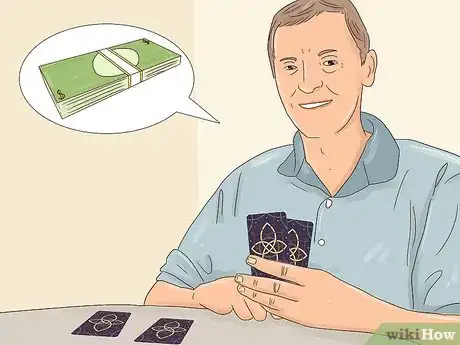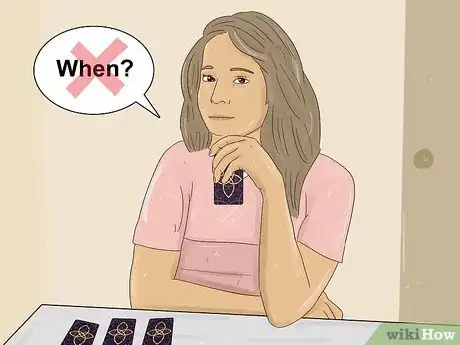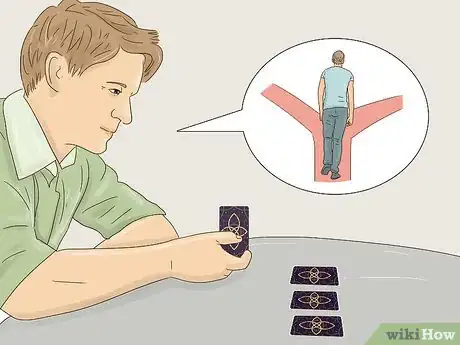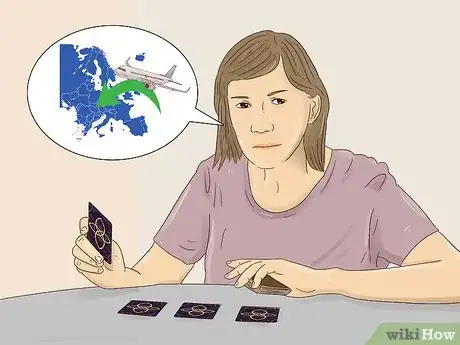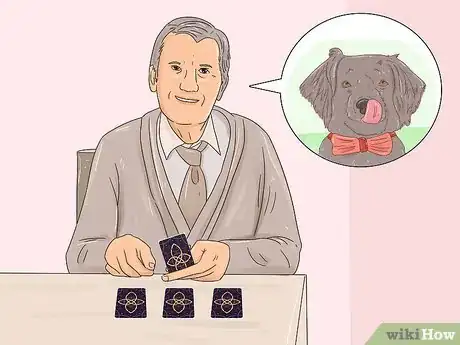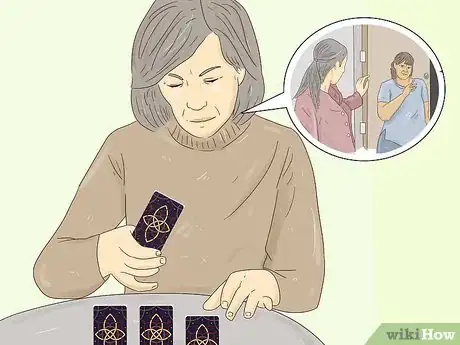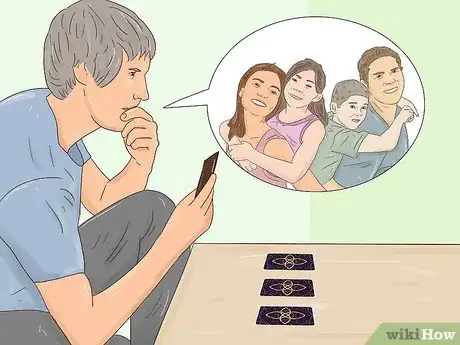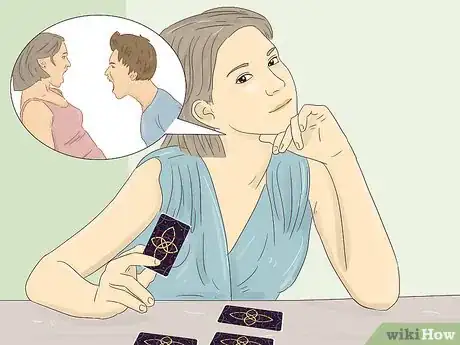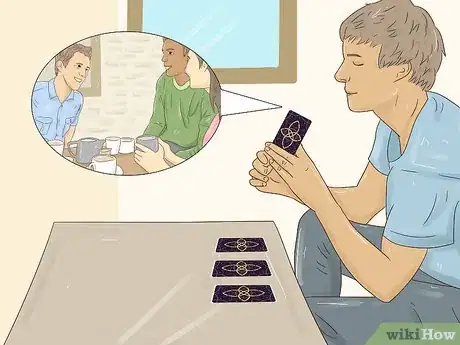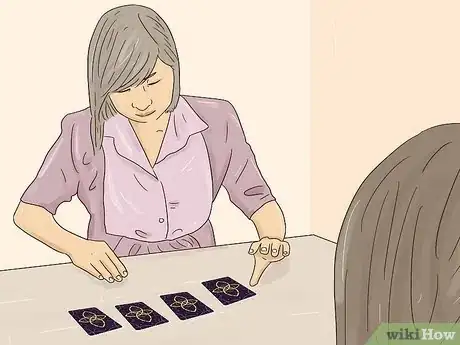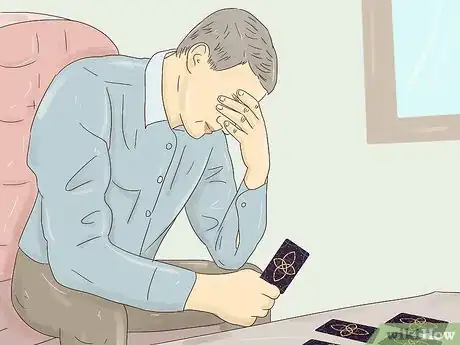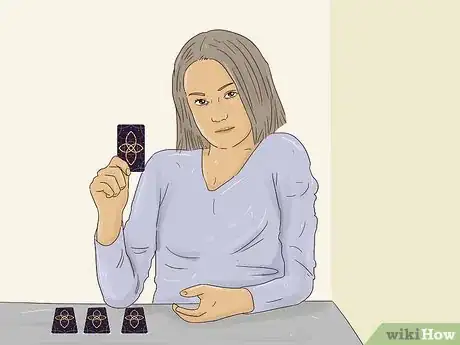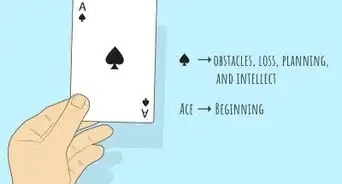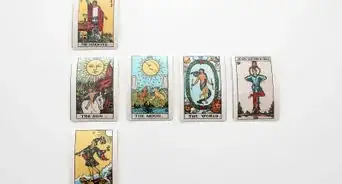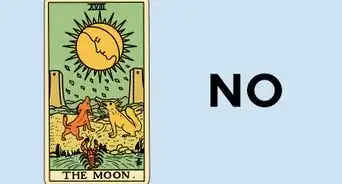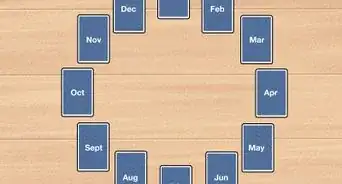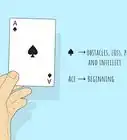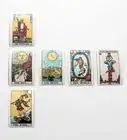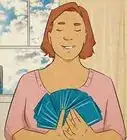This article was co-authored by Susan Levitt. Susan Levitt is a professional tarot card reader, astrologer, and feng shui consultant based in San Francisco, California since 1986. Susan is the author of five books that are published in several languages including Introduction To Tarot and Taoist Astrology. She posts tarot reading updates on Facebook, on Twitter @tarot_tweet, and her lunar blog. Her work has been featured on CNN and she was voted “Best Astrologer” by SF Weekly in San Francisco.
This article has been viewed 69,107 times.
Tarot card questions can be tricky business. It’s not like asking questions from a magic eight ball. Tarot cards are a tool you can use for insight and perspective on some of life’s most difficult and demanding situations, from ending relationships to changing careers. They can help you find areas that need work in your love, work, and financial life. The catch is that you have to ask questions openly and honestly that get to the heart of issues.
Steps
Finding Open-Ended Questions
-
1Start questions with how, what, where or why. Questions that start with how, what, where or why are open-ended, so they allow for deeper answers to some of life’s most trying concerns. Start questions with how, what, where or why for tarot answers that help you explore what you can do to change a situation. Open-ended questions include:
- "How can I free myself from financial struggles?"
- "What areas do I need to work on to bring more love into my life?"
- "Where are there opportunities to help further my career?"[1]
-
2Avoid will, when or should questions. "Should" questions rarely allow tarot cards to help you, because they take away your power to make your own decisions. Similarly, "when" and "will" questions do the same. Avoid will, when or should questions and don’t expect the cards to tell you answers to them, because life is not that straightforward.
- Remember the reason you’re asking help from tarot cards is because there’s no easy solution to your question or concern.
Advertisement -
3Ask about your general life direction. Sometimes you may not have a question about a specific concern. That’s okay. Ask a question about your general life direction like, “Where am I headed on my current path?” or “What energies are surrounding my life right now?” Tarot cards are meant to give insight into your life and general questions can accomplish this.
-
4Phrase questions for guidance. The best tarot questions are phrased in a way to help you get guidance or direction on a concern. Don't expect the cards to tell you what to do in order to take responsibility off yourself. Consider the following examples:
- Don't ask "Should I travel through Europe for three months?" This question shifts responsibility for a life decision off yourself and onto the cards.
- Ask "How will it affect my loved ones if I decide to travel through Europe for three months?" This question allows the cards to give you guidance without shifting responsibility.[2]
Getting to the Root of an Issue
-
1Take everyone involved into account. If there are people involved in the situation or concern you have, consider how everyone is affected--both directly and indirectly. Though tarot questions should be about yourself, be considerate of how your decisions affect others.
- Let's say you're thinking about a career change. Ask yourself how a change in employment might affect people like a roommate or family members.
- Don't forget about your pets! If you're trying to decide on travel plans, be mindful about how they'll handle your absence.[3]
-
2Find a question about benefits or drawbacks. You may need help making an important decision and asking more about potential benefits and drawbacks can help. Just like a list you might make to help with important decisions, look for questions about pros and cons.
- Maybe you’re struggling to know whether you should send an aging parent to an assisted living home or not. Ask “What are the benefits of leaving my Mother at home?” or “What are the drawbacks to leaving my Mother at home?”
- Maybe you want to know whether a difficult relationship should end. Ask "What am I getting out of staying in this relationship?" or "How is this relationship hurting me?"
-
3Find a situation you’d like to improve. We all have areas we’d like to improve on and if you’re honest, you should come up with at least one or two. Look for ways you can improve yourself and the people around you.
- Concerning your body image, ask “How can I feel better about how I look?” or “What can I do to get in better shape?”
- Concerning your family life, ask "How can I spend more time with my loved ones?" or "What can I do to feel closer to my siblings?"
-
4Be concise about what you ask. You may be dealing with what seems like a large problem, but it can always be broken down. Though general questions are great if you don't have a concrete concern, breaking larger issues down can help you get to the root cause. For example:
- Instead of asking “How can I free myself from money struggles?”, ask “Where can additional income come from?” or “How can I save more on a daily basis?”
- Instead of asking "How can I make my relationship better?", ask "Why does my spouse get upset with me, when I do x,y, or z?"
-
5Frame your questions positively. It’s easy to get trapped into negative thinking when something isn’t going as planned. Even if you have concerns as to why things are happening or not happening, keep the question positive. Frame questions so that they're free of negative connotations.
- Ask “What can I do to be a better public speaker?” instead of “Why can’t I overcome my fear of public speaking?”
- Ask "How can I be more sociable?" instead of "Why can't I make more friends?"
Choosing Follow-Up Questions
-
1Speak up if you don’t understand something. Whether you’re going to a professional card reader or exploring a deck of tarot cards on your own, inquire about what you don’t understand. You may draw what looks like a negative card and need more direction. Explore what confusing cards might mean.
- You may draw the hanged man when you want to know how you can help a situation. On the surface, this looks like powerlessness, but it can be about acceptance.
- You could draw the hermit when you ask about how you can bring more excitement into your love life. Instead of saying you’re destined to be alone, it could be saying you need to reflect inwards before you can find a fulfilling love life.[4]
-
2Notice your reaction to cards. The way you respond to cards as they’re laid can give you valuable insight into how you’re dealing with certain situations. Pay attention to your reaction to different cards. Don’t overthink it and write down how you feel about them.[5]
-
3Remember things you might want more direction on. A tarot card reading is no different than a lecture you might have additional questions about afterwards. As you go through a spread of cards, remember the points you could use more direction on.
- If a card indicates you need to embrace your feminine side, remember that and ask “How can I better embrace my femininity?”
- If a card says your expectations are too high, like the four of cups, remember that and ask "How can I be more realistic?"[6]
Expert Q&A
-
QuestionWhat should a person consider when going to a tarot card reading?
 Susan LevittSusan Levitt is a professional tarot card reader, astrologer, and feng shui consultant based in San Francisco, California since 1986. Susan is the author of five books that are published in several languages including Introduction To Tarot and Taoist Astrology. She posts tarot reading updates on Facebook, on Twitter @tarot_tweet, and her lunar blog. Her work has been featured on CNN and she was voted “Best Astrologer” by SF Weekly in San Francisco.
Susan LevittSusan Levitt is a professional tarot card reader, astrologer, and feng shui consultant based in San Francisco, California since 1986. Susan is the author of five books that are published in several languages including Introduction To Tarot and Taoist Astrology. She posts tarot reading updates on Facebook, on Twitter @tarot_tweet, and her lunar blog. Her work has been featured on CNN and she was voted “Best Astrologer” by SF Weekly in San Francisco.
Tarot Card Reader You need to decide what your questions are so that you come prepared for the reading. Your tarot card reader won't judge or criticize you about your questions, so don't worry about that. Work, spiritual path, and relocation are the most popular topics for questions.
You need to decide what your questions are so that you come prepared for the reading. Your tarot card reader won't judge or criticize you about your questions, so don't worry about that. Work, spiritual path, and relocation are the most popular topics for questions. -
QuestionHow do I ask follow-up question at a tarot card reading?
 Susan LevittSusan Levitt is a professional tarot card reader, astrologer, and feng shui consultant based in San Francisco, California since 1986. Susan is the author of five books that are published in several languages including Introduction To Tarot and Taoist Astrology. She posts tarot reading updates on Facebook, on Twitter @tarot_tweet, and her lunar blog. Her work has been featured on CNN and she was voted “Best Astrologer” by SF Weekly in San Francisco.
Susan LevittSusan Levitt is a professional tarot card reader, astrologer, and feng shui consultant based in San Francisco, California since 1986. Susan is the author of five books that are published in several languages including Introduction To Tarot and Taoist Astrology. She posts tarot reading updates on Facebook, on Twitter @tarot_tweet, and her lunar blog. Her work has been featured on CNN and she was voted “Best Astrologer” by SF Weekly in San Francisco.
Tarot Card Reader You might have two, three, four, or even ten questions about your topic. Help your tarot card reader get down to the essential core issue for which you came to the reading.
You might have two, three, four, or even ten questions about your topic. Help your tarot card reader get down to the essential core issue for which you came to the reading. -
QuestionHow do you ask tarot cards a question?
 Susan LevittSusan Levitt is a professional tarot card reader, astrologer, and feng shui consultant based in San Francisco, California since 1986. Susan is the author of five books that are published in several languages including Introduction To Tarot and Taoist Astrology. She posts tarot reading updates on Facebook, on Twitter @tarot_tweet, and her lunar blog. Her work has been featured on CNN and she was voted “Best Astrologer” by SF Weekly in San Francisco.
Susan LevittSusan Levitt is a professional tarot card reader, astrologer, and feng shui consultant based in San Francisco, California since 1986. Susan is the author of five books that are published in several languages including Introduction To Tarot and Taoist Astrology. She posts tarot reading updates on Facebook, on Twitter @tarot_tweet, and her lunar blog. Her work has been featured on CNN and she was voted “Best Astrologer” by SF Weekly in San Francisco.
Tarot Card Reader Format the questions the correct way, even if it's multiple choice. You'll usually have a three-card outcome. Follow the proper way of answering the question in a book or app that explains tarot card reading.
Format the questions the correct way, even if it's multiple choice. You'll usually have a three-card outcome. Follow the proper way of answering the question in a book or app that explains tarot card reading.
References
- ↑ https://www.biddytarot.com/the-art-of-asking-powerful-questions/
- ↑ http://www.wishingmoon.com/30-questions-to-ask-the-tarot/
- ↑ http://www.learntarot.com/less7.htm
- ↑ https://www.daily-tarot-girl.com/2015/06/30/20-questions-to-ask-your-tarot-cards-tonight/
- ↑ http://www.learntarot.com/less8.htm
- ↑ http://www.sacred-texts.com/tarot/pkt/pktcu04.htm
